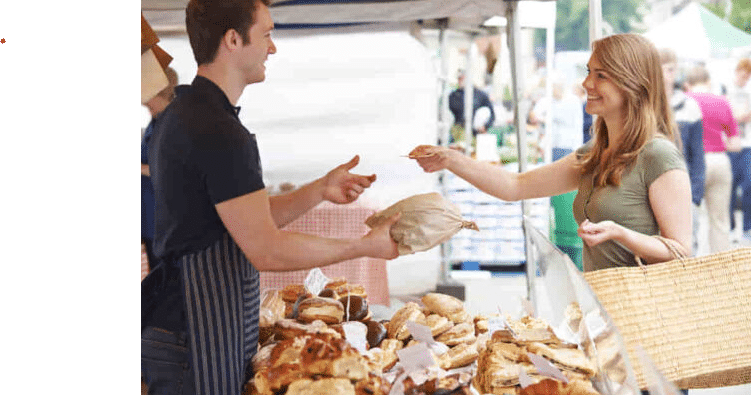

What is a market stall business?
A market stall business is a type of retail business that operates out of a temporary stall or stand. Market stalls are typically found in markets, fairs, and festivals. They can sell a wide variety of products, including food, clothing, handicrafts, and more.
Selling Something? Call Now +03-9460-7100
A market stall can be an inexpensive and fun way to run your own retail business. More than 32,000 companies trade in more than 1,000 markets throughout the AU. There are so many different markets in the AU that you can set up a successful market stall.
You Can Choose From a Variety of Different Markets to Establish Your Market Stall, Including:
Permanent Markets
They are usually run by fixed locations and have been in place for some time. Indoor and outdoor permanent markets are both possible. They may be open all week long or only on certain days. You can decorate your stall and your area, or leave your stock or equipment there after the market closes. Some permanent markets offer stalls that are rotated or don’t allow permanent pitches.
Street Markets
Some street markets are held weekly, but most of them have a set schedule. Some street markets sell only specific products. For example, a clothing or fresh produce market. Some street markets have stalls that sell a wide range of products.
Farmers’ Markets
Farmers or their representatives can sell directly to the public products from their farms. The majority of farmers’ markets sell only local produce. Farmers’ markets sell a variety of products, including meat, dairy, fruits, vegetables, honey, and flowers.
One-day open-air markets
They are not usually held very often. These markets are usually held in conjunction with certain events, and they often take place at the same location as these events. For example, at an airshow or village festival. You will need to reserve or book a space in advance.
Event Markets
These markets are timed to coincide with specific events. A Christmas market is the most popular event market. In the run-up to Christmas, Christmas markets are held all over the UK and they attract many customers.
Specialist Markets
A specialist market only sells a certain type of product. Craft markets and second-hand clothing markets are examples of specialist markets.
Flea Market
Flea markets sell second-hand items such as clothing and CDs.
The Pipeworks Market is still a mainstay of retail. Marketplaces remain popular despite the rise of online shopping and subsequent decline in the high street. Markets offer the chance to socialize, shop and support local businesses. Some markets offer seating, food and drinks. Others provide entertainment or music. Indoor and outdoor markets are available across the country. Markets can be very popular all year round.
When setting up a market stand business, the first thing to do is decide what you will sell. The type of products you sell will dictate the type of markets you trade in.
You can also sell:
- Cooked food.
- Beverages.
- Food products.
- Sweets and other confectionery
- Clothing and fashion
- Shoes and other footwear
- Jewelry.
- Crafts and handmade products
- Home decor and accessories.
- Toys and clothing for children.
- Handmade soaps and candles.
- Vintage products
- Electronics.
- Flowers and potted plants
- Herbs, spices and other ingredients.
- Baked goods
- Personalized Items
- Local products
- Pet Products
- Books.
- Memorabilia.
Market stalls that are successful will run just like any other business. You do not need any prior experience or qualifications, but you will want to have a unique product, an eye for business, and good organization skills.
As a successful market stand owner, you may be responsible for:
- You can order, create or make your own products.
- Bookkeeping and record keeping
- Branding and marketing
- How to set up and run your stall.
- Clean and maintain your area.
- Communication with customers
- Book market slots and pitches.
It Is Important to Research Products, Locations, and the Best Time of Day, Week, or Year for Selling. Contact here!
Want to start selling? Book here!
What is a market stall business?
A market stall business is a type of retail business that operates out of a temporary stall or stand. Market stalls are typically found in markets, fairs, and festivals. They can sell a wide variety of products, including food, clothing, handicrafts, and more.
Selling Something? Call Now +03-9460-7100
A market stall can be an inexpensive and fun way to run your own retail business. More than 32,000 companies trade in more than 1,000 markets throughout the AU. There are so many different markets in the AU that you can set up a successful market stall.
You Can Choose From a Variety of Different Markets to Establish Your Market Stall, Including:
Permanent Markets
They are usually run by fixed locations and have been in place for some time. Indoor and outdoor permanent markets are both possible. They may be open all week long or only on certain days. You can decorate your stall and your area, or leave your stock or equipment there after the market closes. Some permanent markets offer stalls that are rotated or don’t allow permanent pitches.
Street Markets
Some street markets are held weekly, but most of them have a set schedule. Some street markets sell only specific products. For example, a clothing or fresh produce market. Some street markets have stalls that sell a wide range of products.
Farmers’ Markets
Farmers or their representatives can sell directly to the public products from their farms. The majority of farmers’ markets sell only local produce. Farmers’ markets sell a variety of products, including meat, dairy, fruits, vegetables, honey, and flowers.
One-day open-air markets
They are not usually held very often. These markets are usually held in conjunction with certain events, and they often take place at the same location as these events. For example, at an airshow or village festival. You will need to reserve or book a space in advance.
Event Markets
These markets are timed to coincide with specific events. A Christmas market is the most popular event market. In the run-up to Christmas, Christmas markets are held all over the UK and they attract many customers.
Specialist Markets
A specialist market only sells a certain type of product. Craft markets and second-hand clothing markets are examples of specialist markets.
Flea Market
Flea markets sell second-hand items such as clothing and CDs.
The Pipeworks Market is still a mainstay of retail. Marketplaces remain popular despite the rise of online shopping and subsequent decline in the high street. Markets offer the chance to socialize, shop and support local businesses. Some markets offer seating, food and drinks. Others provide entertainment or music. Indoor and outdoor markets are available across the country. Markets can be very popular all year round.
When setting up a market stand business, the first thing to do is decide what you will sell. The type of products you sell will dictate the type of markets you trade in.
You can also sell:
- Cooked food.
- Beverages.
- Food products.
- Sweets and other confectionery
- Clothing and fashion
- Shoes and other footwear
- Jewelry.
- Crafts and handmade products
- Home decor and accessories.
- Toys and clothing for children.
- Handmade soaps and candles.
- Vintage products
- Electronics.
- Flowers and potted plants
- Herbs, spices and other ingredients.
- Baked goods
- Personalized Items
- Local products
- Pet Products
- Books.
- Memorabilia.
Market stalls that are successful will run just like any other business. You do not need any prior experience or qualifications, but you will want to have a unique product, an eye for business, and good organization skills.
As a successful market stand owner, you may be responsible for:
- You can order, create or make your own products.
- Bookkeeping and record keeping
- Branding and marketing
- How to set up and run your stall.
- Clean and maintain your area.
- Communication with customers
- Book market slots and pitches.
It Is Important to Research Products, Locations, and the Best Time of Day, Week, or Year for Selling. Contact here!
Want to start selling? Book here!


